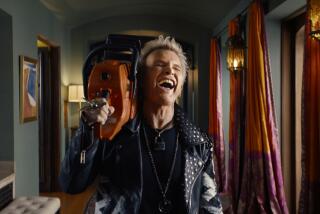Castro, Cronies Help Hal Riney Agency Capture Top Ad Award
- Share via
Unwitting Communist leaders walked away Monday evening with perhaps the premier prize in capitalism--the Clio Award for the best national TV ad campaign.
The award went to three spots for Stroh’s Light beer that feature cleverly dubbed newsreel footage of Fidel Castro, Daniel Ortega and Nikita Khrushchev. The ads were created by the San Francisco agency Hal Riney & Partners.
For the record:
12:00 a.m. June 20, 1990 For the Record
Los Angeles Times Wednesday June 20, 1990 Home Edition Business Part D Page 2 Column 6 Financial Desk 1 inches; 22 words Type of Material: Correction
Honda Ad--A photograph of a Honda Accord ad was reversed during processing. As a result, in Tuesday’s editions the car was shown facing the wrong direction.
The outcome was assuredly not a Communist plot. Credit, instead, must go to pinpoint editing and Madison Avenue hocus-pocus that makes the Communist leaders appear to be discussing their desires to obtain Stroh’s Light beer. These words are dubbed into the mouth of an angry Castro: “We’re only 90 miles away and we can’t even get a decent beer.” And an interpreter-aided Khrushchev says in broken English that Stroh’s Light is even better than vodka.
California residents may not be familiar with the Stroh’s ads because they aired primarily in the Midwest. The winning spots, which were supposed to be a small part of a larger campaign, ran for just four months last year. “They generated a lot of awareness,” said Peter Cline, senior vice president of sales at Stroh’s Brewing Co. “Of course, we got several complaints from people who felt this wasn’t the proper way to sell beer.”
Proper or not, it quickly caught consumer attention. The campaign was the brainchild of Paul Mimiaga, senior vice president at Hal Riney. He said he was influenced by the 1966 Woody Allen film, “What’s Up, Tiger Lily,” a low-grade Japanese spy film dubbed to become the story of a Japanese James Bond who is searching for the world’s greatest egg salad recipe.
“We wanted celebrities, but the client couldn’t afford them,” said Mimiaga. “Besides, it’s hard to get celebrities to say what you want.”
Instead, the agency went sifting through stock news footage of various political leaders. “We specifically chose celebrities we knew we wouldn’t have to pay,” said Mimiaga, whose voice is used in all the spots. The cost of the three winning ads: less than $10,000 each. That’s a fraction of the estimated $250,000 that the typical national TV ad costs these days.
Far more expensive--well in excess of $300,000--was the ad for Honda Accord created by the Los Angeles agency Rubin Postaer & Associates. It won three Clios. In the ad, a visitor is so enamored with a car hanging on a wall at an art gallery that he steps in and drives it off.
Perhaps not entirely by coincidence, Accord became the best-selling nameplate in America last year--the first time a Japanese car accomplished that feat. “Did that one ad do it in isolation? Of course not,” said Gerrold R. Rubin, president of the agency. “But combined with our other commercials, we think the campaign had some impact.”
No agency had more impact on this year’s competition than BBDO Worldwide. BBDO won six Clio awards at the ceremony at New York’s Lincoln Center for ads created for four different clients, including a Pizza Hut spot that features an absent-minded Little Leaguer and a Diet Pepsi ad in which a monkey uses a Diet Pepsi can to communicate with a researcher.
Meanwhile, Joe Pytka, the Venice director recognized as one of the best in the business, walked off with two Clios for ads he directed for General Electric and Apple Computers.
Although the Venice agency Chiat/Day/Mojo won a Clio for an ad for Mitsubishi electronics, it failed to win any Clios for its much-talked-about “roving bunny” campaign for Eveready batteries. Also, the popular Nike campaign featuring Bo Jackson and Bo Diddley strumming guitars failed to win a Clio for the Portland, Ore., agency Wieden & Kennedy.
In pure quantity, it was something of an off year for the competition, which received fewer than 10,000 entries in the TV commercial category--about 1,500 less than last year--in part due to a slumping economy. But in quality, said Clio Chairman Bill Evans, the entries haven’t been as good in years.
“The dust of the agency mega-mergers has all settled,” Evans said. “Agencies can now worry about their clients instead of who is trying to purchase them.”


